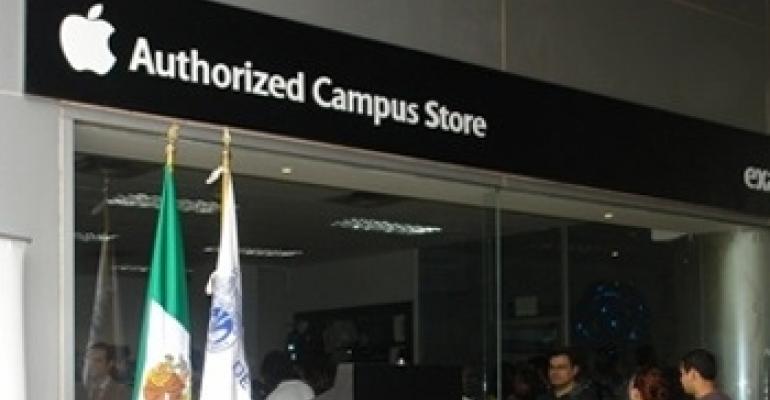
Mall owners might still be debating whether they should confer the status of anchor and associated privileges on Apple stores within their centers, but Apple is already thinking about its next step in the site selection game.
After setting up shop at class-A malls and high traffic urban streets around the country, the current golden goose of retailing appears to have set its sights on transportation hubs and college campuses.
In July, Apple confirmed that it signed a 10-year lease with New York City’s Metropolitan Transportation Authority (MTA) to open a 23,000-square-foot store at Grand Central Terminal. Apple has reportedly agreed to pay $800,000 a year for the high-profile location, previously occupied by a restaurant. The rate might eventually increase to $1 million a year.
Since the beginning of the year, Apple has also been looking at potential locations within bookstores on large college campuses. In February, Yale Daily News reported the retailer was negotiating a store in a vacant Barnes & Noble space at its New Haven, Conn. campus. In May, the University of Delaware announced that Apple would open a store within an existing bookstore on its campus. Apple did not return calls seeking comment.
Opening stores at non-traditional venues would be a nice complement to Apple’s existing fleet, helping to promote the brand among long-term Dell users as well as target locations with extremely high traffic counts and an appetite for computer gadgets, according to Lew Kornberg, managing director in the corporate retail solutions group of commercial real estate services firm Jones Lang LaSalle.
“Apple wrote the textbook on the interconnectivity of branding and sales,” Kornberg notes. “I suspect part of what they are doing with Grand Central is trying to further expose their brand and product. But Grand Central is also the epicenter of the mobile consumer; the iPad and the iPhone are geared to folks on the move, so Grand Central makes perfectly good sense.”
Similarly, opening stores on college campuses could help Apple gain market share among the higher education crowd, which has traditionally gravitated toward Dell, according to Joseph French, national director of retail with Sperry Van Ness, a commercial real estate brokerage firm. French has three college-age children and he notes that in the past he was reluctant to buy them Apple computers because there were no Apple repair shops on their campuses. (There were often Dell venues).
Having an Apple store on site would make it more likely the students’ parents would invest in Apple products, since many of the kids already use some of them, French says.
“Clearly, Apple had made major inroads at colleges,” he notes. “Even though iPods are $100 [apiece], college kids dispose of them at a pretty rapid rate, and the new iPad has basically captured the tablet market. By making themselves that much more available, I think college campuses will be a successful plan for Apple.”
Tricky execution
The brokers Site Optimizer interviewed for this story thought that transportation venues would be a limited play for Apple, since few hubs can compare to Grand Central Terminal in daily foot traffic and overall prominence. In addition, Grand Central offers the kind of convenience that can hardly be matched by even the highest profile existing Apple stores, according to French.
“It’s much easier to get to than the General Motors [GM] building,” French says, referring to Apple’s store on Fifth Avenue and 59th Street in New York. “The sales here will be astronomical and I predict it will surpass the GM store.”
There might be a few other stations around the country where Apple could make a similar play, including Union Station in Washington, D.C., Ogilvie Transportation Center in Chicago and 30th Street Station in Philadelphia, according to Kornberg. But there is no reason to expect an Apple store at dozens of transportation terminals, he notes.
When it comes to campus stores, the main issue might be the fact that students don’t typically buy their own computer gadgets, says Jason Baker, principal with Houston, Texas-based Baker Katz, a commercial real estate services firm and a member of X Team International, a retail real estate brokerage alliance. Instead, parents are often the ones purchasing big ticket items like computers at home.
One way to ensure a successful strategy on campuses would be to target universities with high population densities, including schools in big cities like Boston and schools with student counts of at least 40,000, notes French. The Harvard bookstore in Cambridge, Mass., for instance, tends to draw not only Harvard students, but also tourists and people who live in the area, he says. Other campuses that might fit the mold would be University of South California in Los Angeles and Duke University in Durham, N.C.
It would also be a smart move to limit Apple’s presence on campuses to stores-within-stores which, by necessity, would be a lot smaller than its mall locations, say both French and Baker. While universities normally charge lower rents than traditional retail venues, the equation has to work out for Apple in terms of sales per square foot, Baker notes.
In many cases, campus stores “are less profit centers for the college and more of an amenity or a service that a college could point to during a tour,” he says.

